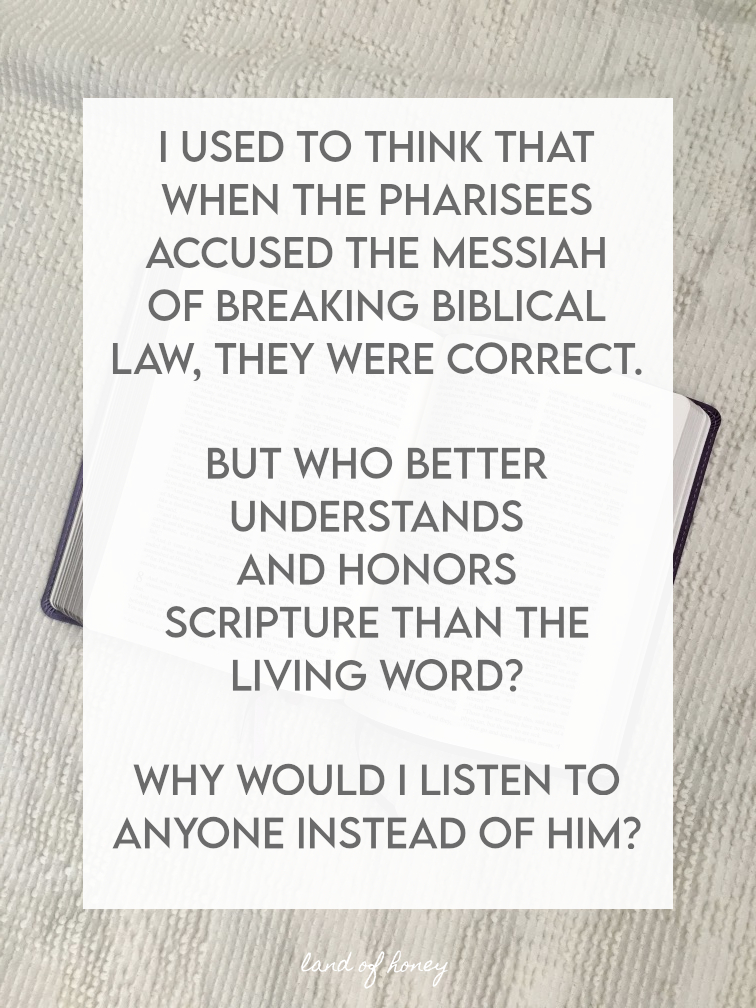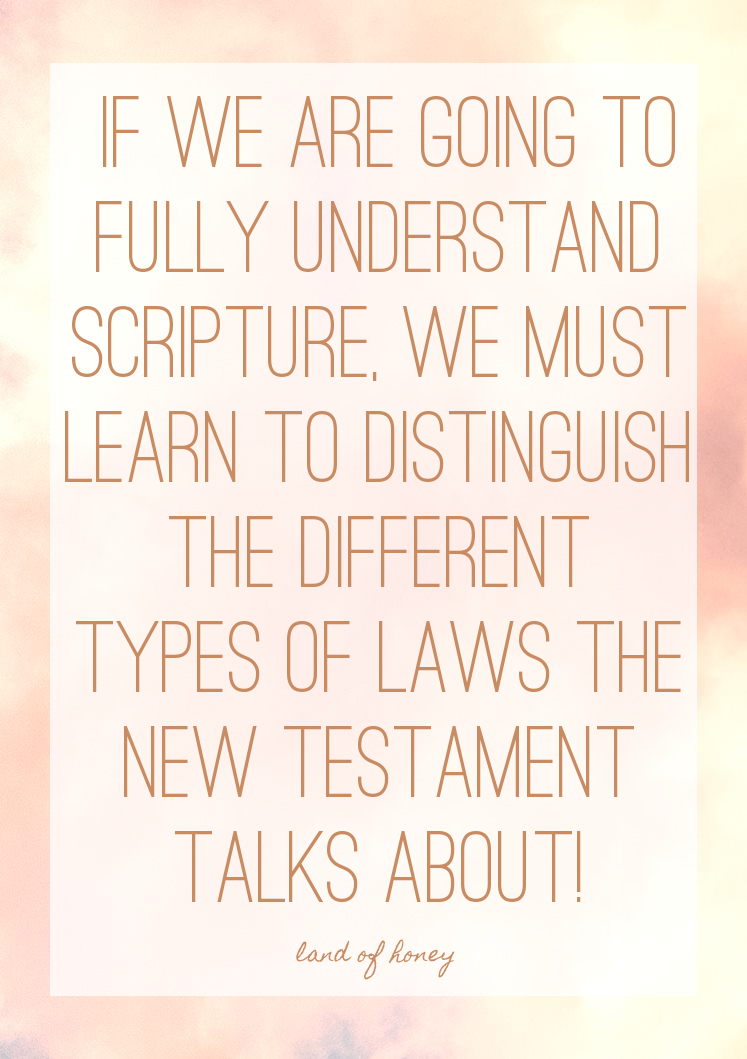When I was first learning about keeping Scripture's instructions today, I cannot tell you how confusing it was to read through much of the New Testament. Is the law good? Is the law bad? Was it done away with? Are we free from it? Is it only for certain people?
There are literally statements like, "Trying to keep the law is severing yourself from the Messiah," but also completely contradictory statements like, "Doers of the law will be considered righteous." Both of these things can't be true, but the Bible is inerrant...so which is it? And what does it mean for verses that say the opposite?
There are three kinds of laws that the New Testament talks about, and sadly most translations of Scripture completely fail to distinguish these at all. Each of these is distinct from the others. If we don't pause and pay attention to which type is being talked about, we are going to end up very confused and completely misunderstand significant portions of the Bible.
The three laws of Scripture:
-The commandments. These are laws that have been expressly given to us in Scripture. These include instructions on how to serve YHWH, the ten commandments, loving our neighbor, dietary restrictions, celebrating the Biblical holidays, not practicing idol worship, honoring our parents, keeping the Sabbath, and so forth. These are often referred to simply as, "the Torah." Some would call these instructions the Book of the Covenant. Across the board, the commandments are upheld and spoken highly of in the New Testament. These are often referred to as the instructions, the law, commands, or Biblical law.
-The instructions for the Levitical priesthood. These detail how the Tabernacle should be operated, and gives laws for sacrifices and offerings. Many would call these regulations the Book of the Law. These laws are no longer in effect. It's been nearly 2,000 years since anyone observed these laws after the Temple was destroyed. But much more significantly, believers no longer need to meet these requirements because the Messiah is now our high priest; his priestly order is Melchizedek, and not Levi. Hebrews 7:12 says that since the priesthood was transferred from Levi to Melchizedek this necessitates a change in the law as well. The change is not that the commandments are no longer in effect, the change is that we do not observe the rules for the Levitical priesthood. You can see more on this here.
-Jewish laws. These are manmade rules from the faith of Judaism. They are not commandments that come from YHWH, or anywhere in the Bible. These laws are traditions of men and not something that Scripture teaches. The Messiah spoke against Jewish laws such as the prohibition of healing on the Sabbath, and ritual handwashing before meals. Examples of Jewish laws today are things like lighting candles at the start of the Sabbath or not turning on lightbulbs on the Sabbath. These are not commands from the Bible and believers are not given 'bonus points' for keeping them. Some people call these the "oral law" or Talmudic law.
Again, it is to great misunderstanding that most translations of the Bible do not make distinctions between these. Unfortunately they are typically all just called, "law." Now it's confusing enough to make differentiation between the commandments of YHWH and the laws for the Levitical priesthood...but at least those both came from the Creator! But when we confuse the laws of YHWH with the teachings of men, we have a huge problem. When we mix these up, we not only misunderstand the verse, but can walk away thinking that it says the exact opposite of what it really means!
1 Corinthians 9:20-21 NIV is a prime example of this confusion:
"To those under the law, I became like one under the law (though I myself am not under the law), so as to win those under the law. To those not having the law I became like one not having the law (though I am not free from God's law, but am under Christ's law), so as to win those not having the law."
Is he under the law or isn't he? What on earth is he talking about if "law" is supposed to mean the same thing? He literally says he's not under the law, then says he is under the law!
If we make the distinction between the different types of laws, this passage makes a lot more sense.
"To those under the Jewish law, I became like one under the Jewish law (though I myself am not under Jewish law), so as to win those under Jewish law. To those not having the law I became like one not having the law (though I am not free from YHWH's law, but am under it), so as to win those not having the law of YHWH."
Paul does not consider himself under Jewish law. But he does consider himself to be under the commandments of YHWH. Paul made a distinction between the types of law Scripture talks about. If we learn to recognize that Paul refers to the different types of laws his writings start to make a lot more sense.
Other examples of the importance of distinguishing which law is being talked about:
If you are led by the Spirit, you are not under the law. - Galatians 5:18
Type of law this is referencing: Levitical.
I used to think this meant that you didn't have the Holy Spirit if you were keeping the Sabbath day, etc. But does it make any kind of sense that the Holy Spirit would lead us away from the written word of YHWH? In the context of Galatians, Levitical law is a major theme. If you have the Holy Spirit would you be lead towards animal sacrifice in place of the blood of the Messiah? Absolutely not! If we are led by the Spirit, we are not under the Levitical priesthood. More on why we don't need to sacrifice animals here.
You are aware that it is against our law for a Jew to associate with a Gentile. But YHWH has shown me that I should not call anyone unclean. - Acts 10:28
Type of law this is referencing: Jewish.
Scripture does not teach this, so this does not come from the Biblical commandments or the instructions for the Levitical priesthood. The law Peter references is Jewish law. So YHWH is not changing the Biblical law, but rather teaching believers to set aside this Jewish law. More on Peter's vision here.
This is the new covenant I will make: I will put my laws on their minds and write them on their hearts. -Hebrews 8:10
Type of law this is referencing: Biblical commandments.
It wouldn't make a lot of sense for YHWH to write the laws for the Levitical priests on our hearts, now that the Melchizedek priesthood is in effect. And the use of 'my' is a giveaway that he is not talking about the manmade Jewish law. His commandments teach us how to have relationship with him and to live in ways that glorify him. Naturally these would be what he would want us to think about and treasure in our hearts.
Sacrifice and offering you did not desire... -Hebrews 10:5
Type of law this is referencing: Levitical.
While the word 'law' isn't actually used in this passage, I had always incorrectly associated verses like this with the Biblical commandments for how are to live. I would read that he didn't want sacrifice and wrongly assume that he didn't want the rules surrounding the Sabbath day, interacting with our neighbors, the dietary regulations, etc. either. But those instructions help us to have closer relationship with the Creator. What he didn't want was for us to be disobedient to those things and the animal sacrifice system of the Levitical priesthood to be needed. Not to say that it was bad, but it is the lesser of what YHWH offers us.
Since you, a Jew by birth, have discarded the law and are living like a Gentile, why are you trying to make these Gentiles follow Jewish law? -Galatians 2:14
Type of law this is referencing: Jewish.
Paul is not accusing Peter of having discarded the commandments of YHWH; this is a discussion of Peter reverting to observing Jewish law because he was fearful of certain people. We saw in Acts 10 that Peter was expressly told to eat with Gentile believers even though it was against Jewish law. Paul is reminding him to hold the commandments of Scripture above Jewish tradition.
There is a setting aside of the previous law because it was weak and unprofitable. -Hebrews 7:18
Type of law this is referencing: Levitical.
The author of Hebrews is not insulting the Biblical commandments here. They are not saying that the Living God's instructions are not profitable. They are saying that the system of Levitical law was not YHWH's perfect plan, and it is now being set aside in favor of his best plan (salvation through the Messiah under the Melchizedek priesthood). Since it is referring to the Levitical law, this passage does not say that the Biblical commandments are set aside.
You who are trying to keep the law are severed from Messiah. -Galatians 5:4
Type of law this is referencing: Levitical.
Why would trying to keep the commandments sever us from the Messiah? He kept all these himself and told us he wasn't doing away with the commandments. Scripture tells us we should live as he did! Implementing the Bible's instructions into our lives so that we can live in a way that honors YHWH, never cuts us off from the Messiah. But if in disobedience to Scripture we insist on holding onto the animal sacrificial system because we don't think the Messiah's death covers our sins, that will keep us very far from him indeed.
Those who obey the law will be declared righteous. - Romans 2:13
Type of law this is referencing: Biblical commandments.
If we don't make a distinction between the type of law Scripture is talking about, we will inevitably misunderstand the word of God. This verse tells us that obedience to the law is a righteous thing, but the above verse from Galatians said it cuts us off from the Messiah. Both of these meanings cannot be correct if it's the same law. We know from Scripture that righteousness does not come from adhering to Jewish law and it doesn't come from the animal sacrifice of the Levitical priesthood. But obeying YHWH's commandments? That is a path to righteousness.
Can you see from this handful of examples how we can have drastic misunderstandings of YHWH's word if we don't discern which type of law is being spoken of? Many times in the New Testament one verse says something about the 'law' and a few chapters later it says literally the exact opposite. Scripture is cohesive and makes sense with the rest of itself. If it seems like it contradicts itself it is talking about two different things. We must learn to make these distinctions if we are going to fully understand Scripture, and know how we are expected to live today.
Related posts:
Commandments or Traditions - Understanding the New Testament
Four Distinctions We Need to Make to Understand Scripture
Understanding Galatians
Did the Messiah Break the Law?






5.jpg)
7.jpg)
.jpg)
.jpg)












.JPG)